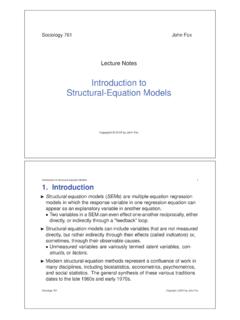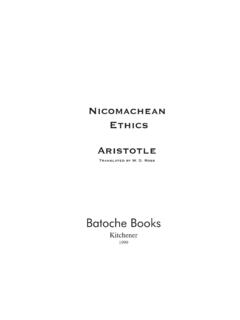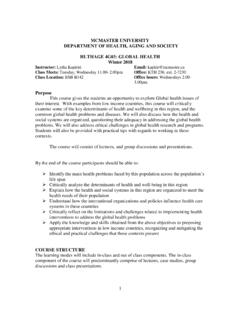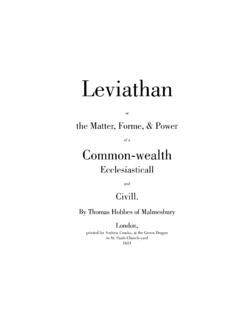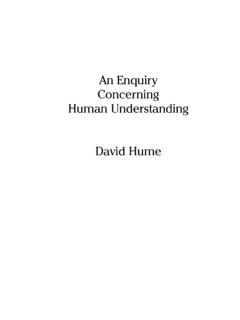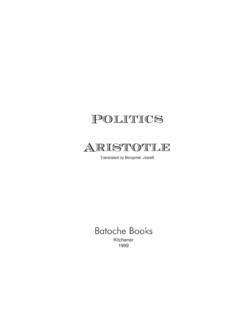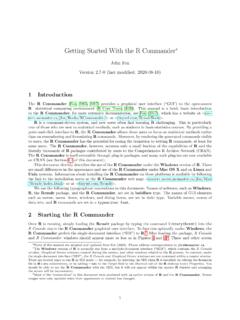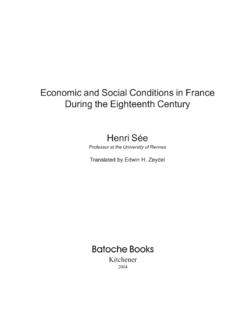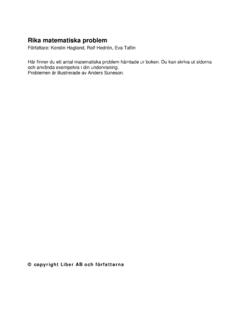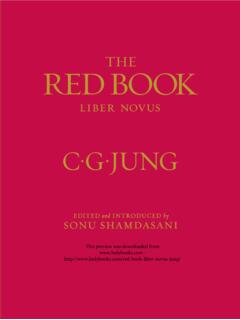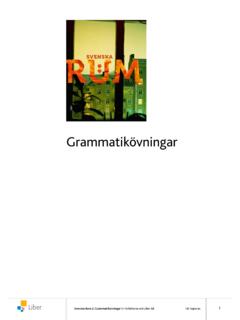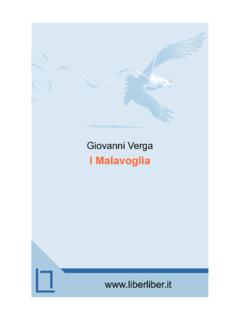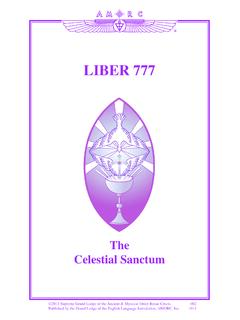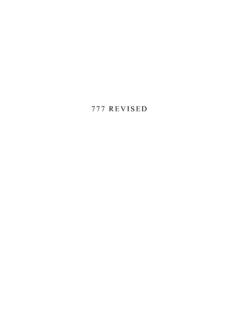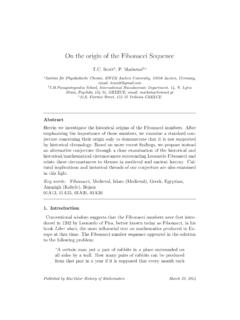Transcription of On Liberty John Stuart Mill - McMaster Faculty of Social ...
1 On LibertyJohn Stuart Mill1859 Batoche BooksKitchener2001 Batoche Books Limited52 Eby Street SouthKitchener, OntarioN2G 3L1 Canadaemail: 1: Introductory .. 6 Chapter 2: Of the Liberty of Thought and Discussion.. 18 Chapter 3: Of Individuality, as one of the Elements of Well-being.. 52 Chapter 4: Of the Limits to the Authority of Society over the Indi-vidual.. 69 Chapter 5: Applications.. 86 Notes .. 106 DedicationThe grand, leading principle, towards which every argument unfoldedin these pages directly converges, is the absolute and essential impor-tance of human development in its richest diversity. Wilhelm von Humboldt: Sphere and Duties of the beloved and deplored memory of her who was the inspirer, and inpart the author, of all that is best in my writings- the friend and wifewhose exalted sense of truth and right was my strongest incitement, andwhose approbation was my chief reward I dedicate this volume.
2 Likeall that I have written for many years, it belongs as much to her as tome; but the work as it stands has had, in a very insufficient degree, theinestimable advantage of her revision; some of the most important por-tions having been reserved for a more careful re-examination, whichthey are now never destined to receive. Were I but capable of interpret-ing to the world one half the great thoughts and noble feelings which areburied in her grave, I should be the medium of a greater benefit to it,than is ever likely to arise from anything that I can write, unpromptedand unassisted by her all but unrivalled Stuart MillChapter 1 IntroductoryThe subject of this Essay is not the so-called Liberty of the Will, sounfortunately opposed to the misnamed doctrine of Philosophical Ne-cessity; but Civil, or Social Liberty : the nature and limits of the powerwhich can be legitimately exercised by society over the individual.
3 Aquestion seldom stated, and hardly ever discussed, in general terms, butwhich profoundly influences the practical controversies of the age by itslatent presence, and is likely soon to make itself recognised as the vitalquestion of the future. It is so far from being new, that, in a certainsense, it has divided mankind, almost from the remotest ages; but in thestage of progress into which the more civilised portions of the specieshave now entered, it presents itself under new conditions, and requires adifferent and more fundamental struggle between Liberty and Authority is the most conspicu-ous feature in the portions of history with which we are earliest familiar,particularly in that of Greece, Rome, and England.
4 But in old times thiscontest was between subjects, or some classes of subjects, and the Gov-ernment. By Liberty , was meant protection against the tyranny of thepolitical rulers. The rulers were conceived (except in some of the popu-lar governments of Greece) as in a necessarily antagonistic position tothe people whom they ruled. They consisted of a governing One, or agoverning tribe or caste, who derived their authority from inheritance orconquest, who, at all events, did not hold it at the pleasure of the gov-erned, and whose supremacy men did not venture, perhaps did not de-sire, to contest, whatever precautions might be taken against its oppres-sive exercise. Their power was regarded as necessary, but also as highlydangerous; as a weapon which they would attempt to use against theirsubjects, no less than against external enemies.
5 To prevent the weakermembers of the community from being preyed upon by innumerablevultures, it was needful that there should be an animal of prey strongerthan the rest, commissioned to keep them down. But as the king of thevultures would be no less bent upon preying on the flock than any of theminor harpies, it was indispensable to be in a perpetual attitude of de-fence against his beak and claws. The aim, therefore, of patriots was toset limits to the power which the ruler should be suffered to exerciseover the community; and this limitation was what they meant by was attempted in two ways. First, by obtaining a recognition of cer-tain immunities, called political liberties or rights, which it was to beOn Liberty /7regarded as a breach of duty in the ruler to infringe, and which if he didinfringe, specific resistance, or general rebellion, was held to be justifi-able.
6 A second, and generally a later expedient, was the establishmentof constitutional checks, by which the consent of the community, or of abody of some sort, supposed to represent its interests, was made a nec-essary condition to some of the more important acts of the governingpower. To the first of these modes of limitation, the ruling power, inmost European countries, was compelled, more or less, to submit. Itwas not so with the second; and, to attain this, or when already in somedegree possessed, to attain it more completely, became everywhere theprincipal object of the lovers of Liberty . And so long as mankind werecontent to combat one enemy by another, and to be ruled by a master, oncondition of being guaranteed more or less efficaciously against his tyr-anny, they did not carry their aspirations beyond this time, however, came, in the progress of human affairs, when menceased to think it a necessity of nature that their governors should be anindependent power, opposed in interest to themselves.
7 It appeared tothem much better that the various magistrates of the State should betheir tenants or delegates, revocable at their pleasure. In that way alone,it seemed, could they have complete security that the powers of govern-ment would never be abused to their disadvantage. By degrees this newdemand for elective and temporary rulers became the prominent objectof the exertions of the popular party, wherever any such party existed;and superseded, to a considerable extent, the previous efforts to limitthe power of rulers. As the struggle proceeded for making the rulingpower emanate from the periodical choice of the ruled, some personsbegan to think that too much importance had been attached to the limi-tation of the power itself.
8 That (it might seem) was a resource againstrulers whose interests were habitually opposed to those of the was now wanted was, that the rulers should be identified with thepeople; that their interest and will should be the interest and will of thenation. The nation did not need to be protected against its own was no fear of its tyrannising over itself. Let the rulers be effectu-ally responsible to it, promptly removable by it, and it could afford totrust them with power of which it could itself dictate the use to be power was but the nation s own power, concentrated, and in aform convenient for exercise. This mode of thought, or rather perhapsof feeling, was common among the last generation of European liberal-ism, in the Continental section of which it still apparently Stuart MillThose who admit any limit to what a government may do, except in thecase of such governments as they think ought not to exist, stand out asbrilliant exceptions among the political thinkers of the Continent.
9 Asimilar tone of sentiment might by this time have been prevalent in ourown country, if the circumstances which for a time encouraged it, hadcontinued , in political and philosophical theories, as well as in persons,success discloses faults and infirmities which failure might have con-cealed from observation. The notion, that the people have no need tolimit their power over themselves, might seem axiomatic, when populargovernment was a thing only dreamed about, or read of as having ex-isted at some distant period of the past. Neither was that notion neces-sarily disturbed by such temporary aberrations as those of the FrenchRevolution, the worst of which were the work of a usurping few, andwhich, in any case, belonged, not to the permanent working of popularinstitutions, but to a sudden and convulsive outbreak against monarchi-cal and aristocratic despotism.
10 In time, however, a democratic republiccame to occupy a large portion of the earth s surface, and made itselffelt as one of the most powerful members of the community of nations;and elective and responsible government became subject to the observa-tions and criticisms which wait upon a great existing fact. It was nowperceived that such phrases as self-government, and the power ofthe people over themselves, do not express the true state of the people who exercise the power are not always the same peoplewith those over whom it is exercised; and the self-government spokenof is not the government of each by himself, but of each by all the will of the people, moreover, practically means the will of the mostnumerous or the most active part of the people; the majority, or thosewho succeed in making themselves accepted as the majority; the people,consequently may desire to oppress a part of their number.
